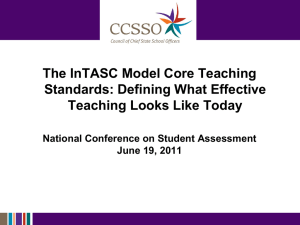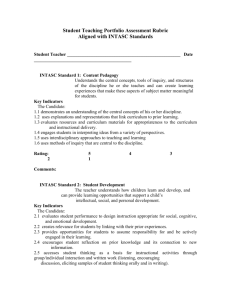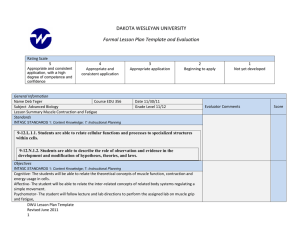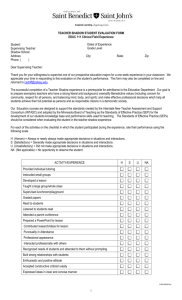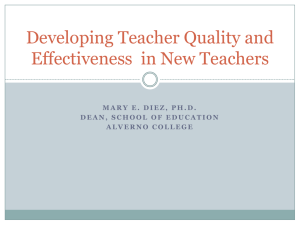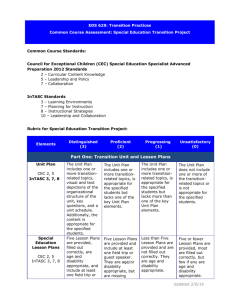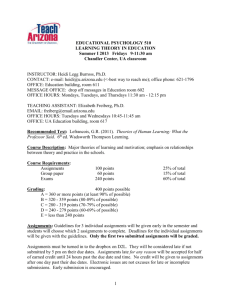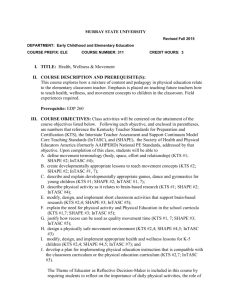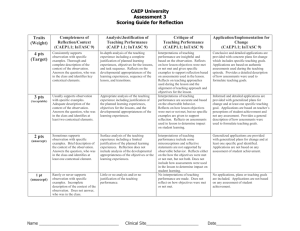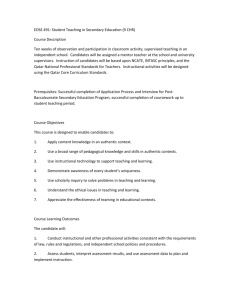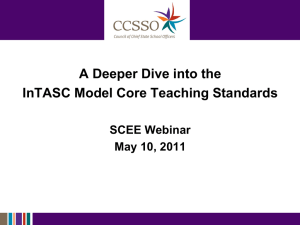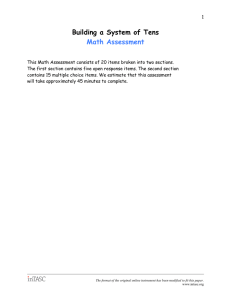Current Course Ed 301 - Principles of Learning and Development in
advertisement
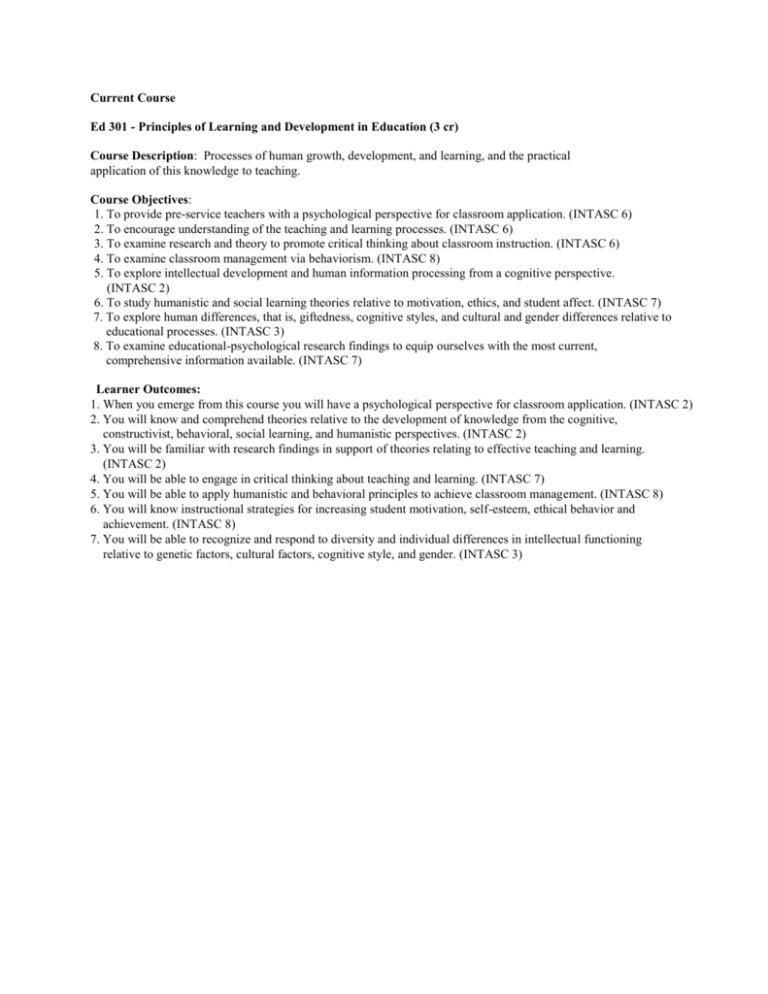
Current Course Ed 301 - Principles of Learning and Development in Education (3 cr) Course Description: Processes of human growth, development, and learning, and the practical application of this knowledge to teaching. Course Objectives: 1. To provide pre-service teachers with a psychological perspective for classroom application. (INTASC 6) 2. To encourage understanding of the teaching and learning processes. (INTASC 6) 3. To examine research and theory to promote critical thinking about classroom instruction. (INTASC 6) 4. To examine classroom management via behaviorism. (INTASC 8) 5. To explore intellectual development and human information processing from a cognitive perspective. (INTASC 2) 6. To study humanistic and social learning theories relative to motivation, ethics, and student affect. (INTASC 7) 7. To explore human differences, that is, giftedness, cognitive styles, and cultural and gender differences relative to educational processes. (INTASC 3) 8. To examine educational-psychological research findings to equip ourselves with the most current, comprehensive information available. (INTASC 7) Learner Outcomes: 1. When you emerge from this course you will have a psychological perspective for classroom application. (INTASC 2) 2. You will know and comprehend theories relative to the development of knowledge from the cognitive, constructivist, behavioral, social learning, and humanistic perspectives. (INTASC 2) 3. You will be familiar with research findings in support of theories relating to effective teaching and learning. (INTASC 2) 4. You will be able to engage in critical thinking about teaching and learning. (INTASC 7) 5. You will be able to apply humanistic and behavioral principles to achieve classroom management. (INTASC 8) 6. You will know instructional strategies for increasing student motivation, self-esteem, ethical behavior and achievement. (INTASC 8) 7. You will be able to recognize and respond to diversity and individual differences in intellectual functioning relative to genetic factors, cultural factors, cognitive style, and gender. (INTASC 3) New Course EDCI 301 – Learning, Development and Assessment (3 cr) Course Description: Exploration of theories of learning and human development and the use of this knowledge to support student success in classroom settings. Provides a practical understanding of motivation as a classroom management tool. Develops a fundamental understanding of assessment terminology; the uses of assessment and its relationship to student success. Course Objectives: Teacher Preparation Standards 1. Knowledge of Subject Matter: The teacher understands the central concepts, tools of inquiry, and structures of the discipline(s) he or she teaches and can create learning experiences that make these aspects of subject matter meaningful for students. 2. Knowledge of Human Development and Learning: The teacher understands how children learn and develop, and can provide learning opportunities that support their intellectual, social and personal development. 3. Adapting Instruction for Individual Needs: The teacher understands how students differ in their approaches to learning and creates instructional opportunities that are adapted to diverse learners. 4. Multiple Instructional Strategies: The teacher understands and uses a variety of instructional strategies to encourage students’ development of critical thinking, problem solving, and performance skills. 5. Classroom Motivation and Management: The teacher uses an understanding of individual and group motivation and behavior to create a learning environment that encourages positive social interaction, active engagement in learning, and self-motivation. 6. Communication Skills: The teacher uses knowledge of effective verbal, nonverbal, and media communication techniques to foster active inquiry, collaboration, and supportive interaction in the classroom. 7. Instructional Planning Skills: The teacher plans instruction based upon knowledge of subject matter, students, and curriculum goals. 8. Assessment of Student Learning: The teacher understands and uses formal and informal assessment strategies to evaluate and ensure the continuous intellectual, social, and physical development of the learner. 9. Professional Commitment and Responsibility: The teacher is a reflective practitioner who continually evaluates the effects of his/her choices and actions on others (students, parents, and other professionals in the learning community) and who actively seeks out opportunities to grow professionally. 10. Partnerships: The teacher fosters relationships with school colleagues, parents, and agencies in the larger community to support students’ learning and well-being. Teacher Education Dispositions Attends regularly. Meets timeline commitments. Dress/Appearance is appropriate and professional. Maintains appropriate relationships with peers. Scholar-practitioner demonstrates adequate content knowledge that is current. Engaged, full participation and takes initiative. Maintains confidentiality and is ethical. Maintains appropriate relationships with students. Committed to and facilitates student's learning in a safe climate. Maintains appropriate relationships with teachers, administration, parents, and community members Respects and advocates for diversity. Responds appropriately to feedback and is flexible. Written work communicates clearly and accurately, and is in standard English. Verbal communication is clear, accurate, appropriate to the situation, and conventions used are standard for speaking situations.
